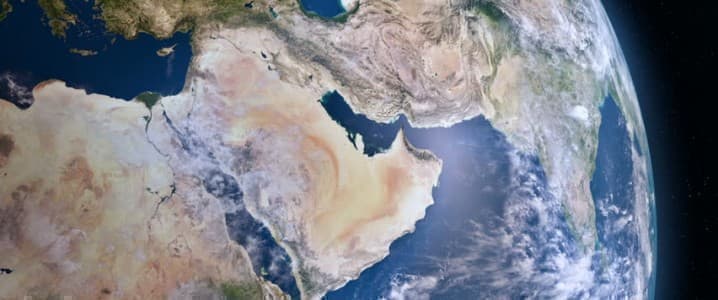Weaning the world off hydrocarbons to fight climate change is this generation’s biggest challenge. It is a challenge that has pushed major OECD members to adopt far-reaching strategies, such as the EU Green Deal or the UK’s future ban on new gasoline-powered cars. Yet demand for oil and gas continues to increase, putting mainstream hydrocarbon-producing countries in the spotlight. This was exemplified last week Iraq’s Finance Minister Ali Allawi, called for oil producers to move into renewable energy.
At first glance, this appears contradictory, with Iraq still funding new oil projects. However, looking at the overall regional picture this claim is less surprising. The Gulf is facing up to the stark possibility of an ‘end to oil’, forcing them to reassess the very basis of their economies. As a result, the first shoots of a Middle Eastern green energy arms race are sprouting, with Iraq’s declaration emblematic of this.
The outcome is still unclear, but the immense emphasis put by major oil producers like Saudi Arabia, or the UAE, in growing their slice of the hydrogen cake, is an obvious sign that strategies are changing. Simultaneously, most Gulf countries are investing heavily into home-grown renewable energy sources, particularly solar in this sun-drenched part of the world.
GCC nations are keeping a closer eye on the shifting political opinions vis-a-vis hydrocarbons. The nervous ones are increasingly panicked about the draconian tone adopted against oil and gas. The smart ones see this as an opportunity. A major climate roundtable co-hosted by U.S. Climate Envoy John Kerry and his UAE counterpart Dr. Sultan Al Jaber in April showed the apparent willingness at least some in this part of the world demonstrate as they tentatively climb aboard the green energy train.
The direction of travel is clear. Speaking on that trip, Kerry said ‘’the importance of an oil and gas-producing nation [the UAE] bringing together a group of nations that many people might think were improbably committed to dealing with the climate crisis” was an unequivocal signal. Without bringing Arab oil producers on board effective climate action will be significantly hampered and people like Kerry know this.
A major diplomatic effort is underway to convince Gulf states that their long-term interests are best served by helping, not hindering the climate cause. Some appear to be signing up, such as the UAE’s ambitious bid to host COP28. Iraq’s Finance Minister’s recent positive statement on renewables can also be seen as major recognition that fighting against the tide of the green energy transition is a battle OPEC cannot win.
Economically, major issues are still there to be dealt with. OPEC countries don’t want to kill the goose that lays the golden eggs. However, these golden eggs can and are being used to finance a cleaner future. Middle East green investments are booming. This year, renewable investments have outstripped conventional power projects in the region for the first time ever. KSA is aiming to add 58.7GW of renewable capacity by 2030 and the UAE is aiming to source 44% of power from clean sources by 2050.
These moves will make the GCC the 2nd largest green energy growth region in the world behind only the USA. Enthusiasm should be tempered, given the concerns about the efficiency of major infrastructure projects in the region. However, with the support from state-backed hydrocarbon behemoths like ADNOC and Aramco, these investment shifts will have a lasting impact.
The educated gamble is that the pain of falling oil demand will be offset by a booming, high-tech renewables industry financed by, but increasingly independent of hydrocarbon revenues. The place to start will be removing the high hydrocarbon dependency in local supply. Next will be investing in hydrogen projects, backed up by major solar or even wind energy investments needed for blue hydrogen production. It not only will help to diversify economies, hydrogen can also be produced by using existing hydrocarbon reserves that otherwise could become stranded assets.
Another major driver is to maintain a global power position by becoming a renewables powerhouse. Substitution of its oil power status can be achieved by full-force backing of green energy. The UAE and Saudi Arabia have already indicated moves in this direction with billions invested in clean power projects across the globe. Finance Minister Ali Allawi may see his wish become a reality sooner than he realizes as oil-producing Gulf states increasingly realize that smart money is going green.
By Cyril Widdershoven for Oilprice.com
More Top Reads From Oilprice.com:
- 3 Bearish Catalysts For Oil This Fall
- Why Hedge Funds Are Turning Bullish On Oil Again
- The Major Problem With EVs No One Is Talking About



















Not really sure what the Middle East is really going to do, but Europe is more of an oil customer than the U.S. And, the Middle East is really baking in the sun under a changing climate. Energy diversification may really happen.
They work on the principle that the global economy will continue to run on oil and gas well into the future until the last drop of oil has been extracted.
The author of this article seems to give prominence to Iraq’s Finance Minister’s calling on oil producers to move into renewable energy. Statements from Iraqi officials mean nothing and are intended to focus attention on themselves. Since the toppling of Iraq’s historic leader the late Saddam Hussein, Iraq’s stature in the world has diminished hugely because of the corruption that is squandering Iraq’s spectacular oil wealth.
Moreover, oil and gas earns Middle Eastern producers lots of money. Financing clean energy other than needed to enhance their oil and gas revenues won’t earn them any money. What else could they export? Therefore, they aren’t going to be seduced by the West to kill the goose that lays the golden eggs.
The last barrels produced will be Arab, Venezuelan and Russian (from the Arctic).
Dr Mamdouh G Salameh
International Oil Economist
Visiting Professor of Energy Economics at ESCP Europe Business School, London